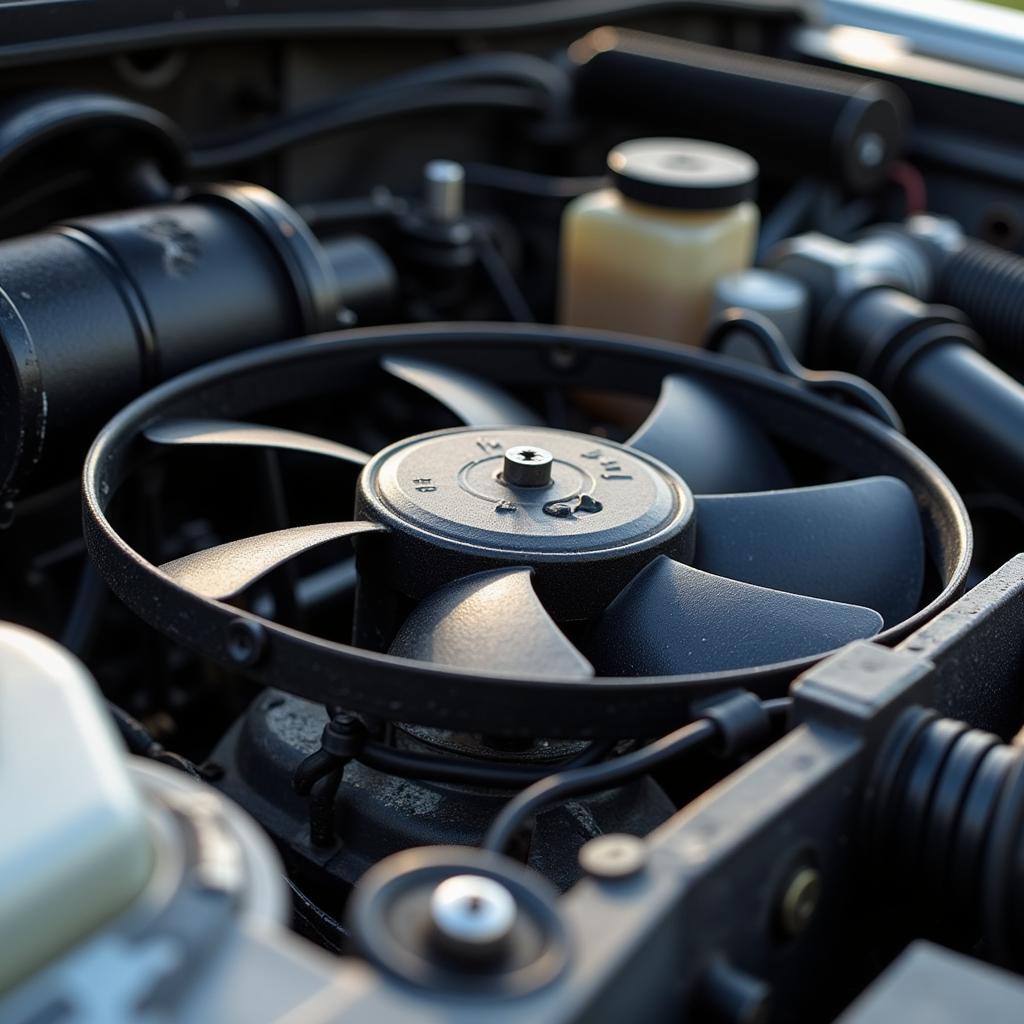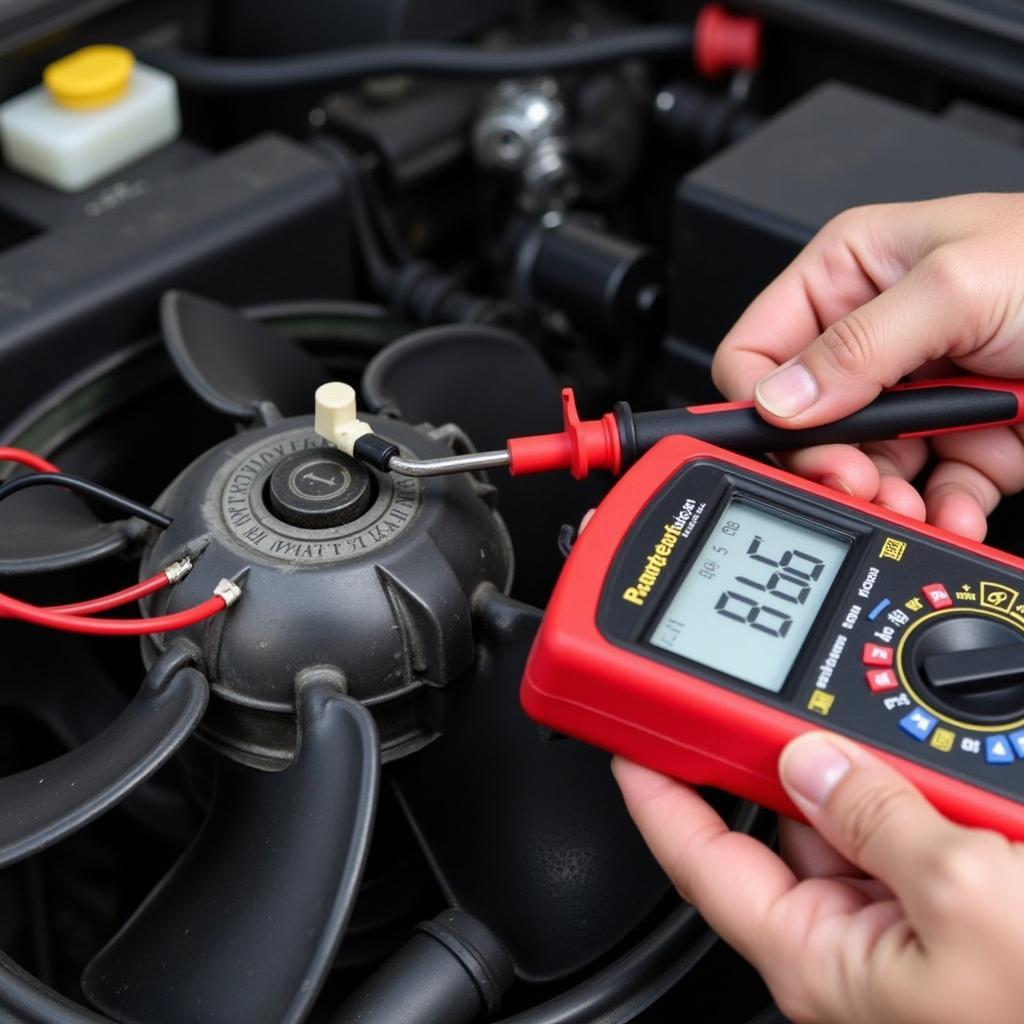Car Engine Fan Problems can lead to overheating, decreased performance, and costly repairs. Understanding how your car’s cooling system works, recognizing common fan issues, and knowing how to troubleshoot them is crucial for maintaining your vehicle’s health and preventing further damage. This article will guide you through the most common car engine fan problems, their causes, and effective solutions.
The cooling system is vital for regulating your engine’s temperature, preventing overheating, and ensuring optimal performance. Key components include the radiator, water pump, thermostat, hoses, and of course, the engine fan. A malfunctioning fan can disrupt this delicate balance, leading to a range of issues. One common problem is the fan not turning on at all, which can quickly lead to overheating, especially in hot weather or during stop-and-go traffic. Another issue is the fan running constantly, even when the engine is cold, which can indicate a faulty sensor or relay. Understanding the different types of fans is also important. Some vehicles utilize a mechanical fan directly connected to the engine, while others employ electric fans controlled by a temperature sensor.
Diagnosing Common Car Engine Fan Problems
One of the first signs of car engine fan problems is overheating. If your temperature gauge is consistently reading high or your engine is steaming, it’s time to investigate. Other symptoms include unusual noises from the fan motor, such as grinding or whirring, and a noticeable decrease in fuel efficiency.
 Car engine fan not spinning
Car engine fan not spinning
What Causes a Car Engine Fan to Malfunction?
Several factors can contribute to car engine fan problems. A blown fuse or relay is a common culprit, particularly for electric fans. A faulty temperature sensor could send incorrect signals to the fan control module, causing it to operate erratically or not at all. Damaged wiring, a malfunctioning fan clutch (for mechanical fans), or a worn-out fan motor can also lead to issues. In some cases, a low coolant level can trigger overheating and put extra strain on the fan, leading to premature failure. For example, I once encountered a car 1997 plymouth breeze problems where the fan wasn’t working due to a corroded wire connecting to the fan motor.
“A simple blown fuse can cause major headaches with your car’s cooling system,” says automotive expert, Robert Johnson. “Always check the fuses first before diving into more complex diagnostics.”
Troubleshooting Your Car Engine Fan
Begin by checking the fuses and relays related to the cooling system. Consult your owner’s manual for their location. If a fuse is blown, replace it with one of the same amperage. Next, inspect the wiring for any damage or loose connections. If you have a mechanical fan, check the fan clutch for proper engagement. If you suspect a faulty temperature sensor, you can test it with a multimeter or replace it preemptively. For electric fans, you can test the fan motor directly by applying power to it.
 Testing the car engine fan with a multimeter
Testing the car engine fan with a multimeter
Solutions for Car Engine Fan Problems
Once you’ve identified the cause of the problem, you can take appropriate action. Replacing a blown fuse, relay, or temperature sensor is usually a straightforward DIY task. However, if the fan motor, clutch, or other major components are faulty, it’s best to consult a qualified mechanic. They have the expertise and tools to diagnose and repair complex cooling system issues effectively. Ignoring car engine fan problems can lead to severe engine damage, including a cracked cylinder head or warped engine block, resulting in expensive repairs. Regular maintenance, such as checking coolant levels and inspecting the fan for signs of wear and tear, can prevent many of these issues from arising. Even seemingly unrelated problems, such as a car no heat problem, can sometimes stem from issues within the broader cooling system.
“Preventative maintenance is key,” adds Johnson. “Regularly inspecting your cooling system can save you time and money in the long run.” It’s also important to understand the implications of other car issues, like common rust problems with flooded cars, which can also impact the cooling system.
Conclusion
Car engine fan problems can range from simple fixes like a blown fuse to more complex issues requiring professional attention. Understanding the components of your cooling system, recognizing the symptoms of fan problems, and knowing how to troubleshoot them can help you avoid costly repairs and ensure your engine runs smoothly. If you’re experiencing persistent car engine fan problems or are unsure about performing the repairs yourself, don’t hesitate to contact us at AutoTipPro for expert advice and assistance. You can reach us at +1 (641) 206-8880 or visit our office at 500 N St Mary’s St, San Antonio, TX 78205, United States.
FAQ
-
How often should I check my car’s engine fan? It’s a good idea to visually inspect your engine fan every time you check your coolant levels, which should be at least once a month.
-
Can I drive my car if the engine fan isn’t working? It’s not recommended. Driving with a malfunctioning engine fan can quickly lead to overheating and serious engine damage.
-
How much does it cost to replace a car engine fan? The cost varies depending on the make and model of your car and whether you have a mechanical or electric fan. It can range from a few hundred to over a thousand dollars.
-
How can I tell if my car’s engine is overheating? Look for a high reading on your temperature gauge, steam coming from the engine compartment, or a sweet, burning smell.
-
What is the difference between a mechanical and an electric engine fan? Mechanical fans are directly connected to the engine via a belt and clutch, while electric fans are controlled by a temperature sensor and operate independently.
-
What are some signs of a bad fan clutch? A roaring noise from the engine compartment, especially at higher RPMs, and overheating at idle are common signs of a bad fan clutch. Issues like those found with carsport canada and car problems can sometimes be related to the fan system as well.
-
Can problems with driverless cars be related to engine cooling? Yes, the complex systems in autonomous vehicles generate significant heat, requiring robust cooling systems. what physics problems are plaguing driverless cars often relate to heat management and efficient cooling.




Leave a Reply